
The Polygonaceae are a family of flowering plants known informally as the knotweed family or smartweed—buckwheat family in the United States. The name is based on the genus Polygonum, and was first used by Antoine Laurent de Jussieu in 1789 in his book, Genera Plantarum. The name may refer to the many swollen nodes the stems of some species have, being derived from Greek, poly meaning 'many' and gony meaning 'knee' or 'joint'. Alternatively, it may have a different derivation, meaning 'many seeds'.

Squirrels are members of the family Sciuridae, a family that includes small or medium-size rodents. The squirrel family includes tree squirrels, ground squirrels, and flying squirrels. Squirrels are indigenous to the Americas, Eurasia, and Africa, and were introduced by humans to Australia. The earliest known fossilized squirrels date from the Eocene epoch, and among other living rodent families, the squirrels are most closely related to the mountain beaver and to the dormice.

The Lycopodiaceae are an old family of vascular plants, including all of the core clubmosses and firmosses, comprising 16 accepted genera and about 400 known species. This family originated about 380 million years ago in the early Devonian, though the diversity within the family has been much more recent. "Wolf foot" is another common name for this family due to the resemblance of either the roots or branch tips to a wolf's paw.

The Old World flycatchers are a large family, the Muscicapidae, of small passerine birds restricted to the Old World, with the exception of several vagrants and two species, bluethroat and northern wheatear, found also in North America. These are mainly small arboreal insectivores, many of which, as the name implies, take their prey on the wing. The family includes 352 species and is divided into 51 genera.

Ground beetles are a large, cosmopolitan family of beetles, the Carabidae, with more than 40,000 species worldwide, around 2,000 of which are found in North America and 2,700 in Europe. As of 2015, it is one of the 10 most species-rich animal families. They belong to the Adephaga. Members of the family are primarily carnivorous, but some members are phytophagous or omnivorous.
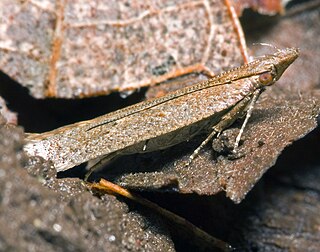
The Gelechiidae are a family of moths commonly referred to as twirler moths or gelechiid moths. They are the namesake family of the huge and little-studied superfamily Gelechioidea, and the family's taxonomy has been subject to considerable dispute. These are generally very small moths with narrow, fringed wings. The larvae of most species feed internally on various parts of their host plants, sometimes causing galls. Douglas-fir (Pseudotsuga) is a host plant common to many species of the family, particularly of the genus Chionodes, which as a result is more diverse in North America than usual for Gelechioidea.

Harpalinae is a subfamily of ground beetles that contains more than 3,000 species in 4 tribes worldwide, according to the Carabcat Database. A rarely used common name for the subfamily is the harp beetles. The Harpalinae contain the most apomorphic ground beetles, displaying a wide range of forms and behaviors. Some are, rare among ground beetles, omnivores or even herbivores.

Broscinae is a subfamily of ground beetles in the family Carabidae. There are more than 30 genera and at least 340 described species in Broscinae.

Carabinae is a subfamily of ground beetles in the family Carabidae. There are about 10 genera and more than 1,400 described species in Carabinae.

Dryptinae is a subfamily of ground beetles in the family Carabidae. There are more than 30 genera and 570 described species in Dryptinae.
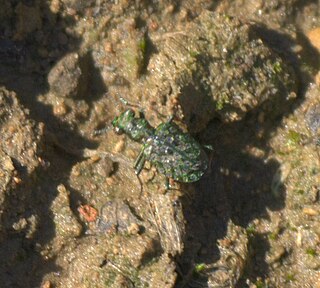
Elaphrinae is a subfamily of ground beetles in the family Carabidae. There are at least 4 genera and more than 50 described species in Elaphrinae.

Lebiinae is a subfamily of ground beetles in the family Carabidae. There are more than 330 genera and 6,300 described species in Lebiinae, in 5 tribes.

Migadopinae is a subfamily of ground beetles in the family Carabidae. There are about 18 genera and more than 40 described species in Migadopinae.

Nebriinae is a subfamily of ground beetles in the family Carabidae. There are about 12 genera and more than 840 described species in Nebriinae.
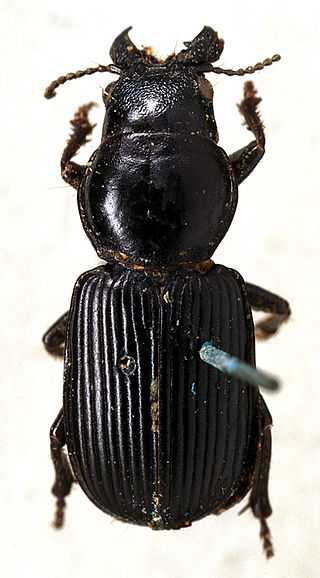
Orthogoniinae is a subfamily of ground beetles. Occasionally it was treated as a tribe Orthogoniini of subfamily Harpalinae, particularly when this was circumscribed loosely.
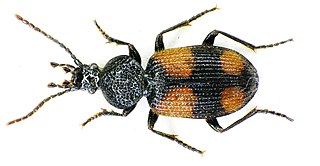
Panagaeinae is a subfamily of beetles in the family Carabidae. There are more than 30 genera and 400 described species in Panagaeinae.
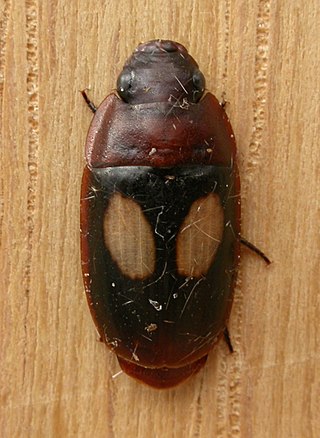
Pseudomorphinae is a subfamily of ground beetles in the family Carabidae. There are about 12 genera and at least 360 described species in Pseudomorphinae.

Psydrinae is a subfamily of beetles in the family Carabidae.

Siagoninae is a subfamily of ground beetles in the family Carabidae. There are at least 3 genera and more than 80 described species in Siagoninae.

Trechinae is a subfamily of ground beetles in the family Carabidae. There are 6 tribes, more than 430 genera, and over 6,700 described species in Trechinae.



















